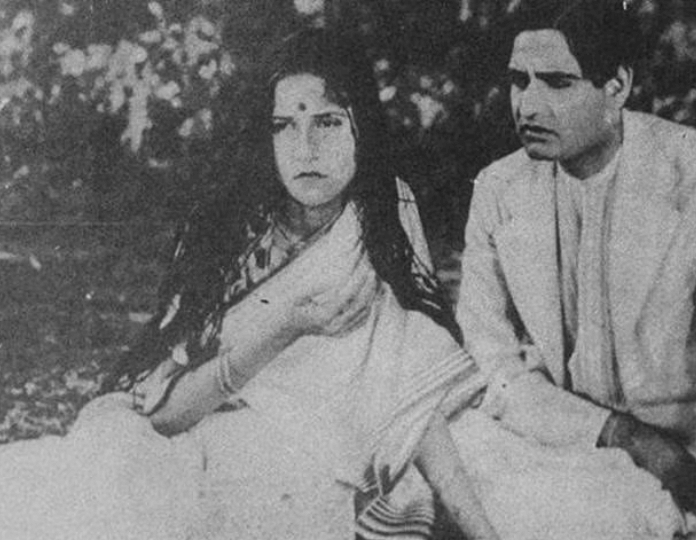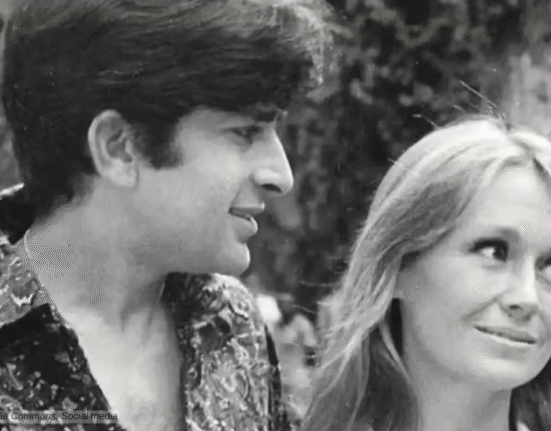Perhaps the most famous actor-singer of all time, KL Saigal became a legend in his lifetime. He is still remembered for his songs such as “Ik Bangala Bane Nyara,” “Ghum Diye Mustakil,” “Kar Lijiye Chal Kar Meri,” “Jab Dil Hi Toot Gaya,” “Babul Mora Naihar Chhuto Jaye,” and many more.
His mellifluous voice and emotive singing style left a permanent mark on the music industry during the 1930s and 1940s. Saigal influenced almost every singer of that era by his style and his unique voice quality. His voice, a mixture of baritone and soft tenor, became the benchmark of good singing.
A fakir singing a ghazal of Ghalib’s. They sat down and listened and when it was over Saigal put his hand in his pocket and whatever was in it—5,000 rupees, a great sum in those days—gave it to the fakir. And when the friend asked whether he knew how much he had given, Saigal said, “Did Oopar Wala count the money when he gave it to me?
Begum Akhtar
Kundan Lal was born in Jammu in 1904. His mother, Kesar Devi, nurtured his talent, and they frequently performed bhajans together. Passionate about music and acting from childhood, he took part in Ram Leela plays, often portraying Sita. His early training comes at the Dera of Sufi saint Salamat Yusef.Here he learned the basics of classical singing from traveling musicians and devotees. He also honed his skills in singin thumri and ghazals. His father, on the other hand, wanted him to study and not waste his time in music. His family, like many in the larger society, does not look at music as a respectable profession.
Contrary to his father’s wishes, he dropped out of school and started working as a railway timekeeper. He also worked as a typewriter salesman for the Remington Typewriter Company in Shimla.
The Begining
He comes to Calcutta with musician Harishchandra Bali, who introduced him to RC Boral, who liked the young Kundan’s voice. Around that time in the 1930s, he was hired by B. N. Sircar’s film studio, “New Theatres,” where he met stalwarts like “Pankaj Mullick,” “K. C. Dey,” and “Pahari Sanyal.”
In Calcutta, KL Saigal first recorded Punjabi songs composed by Harishchandra Bali. These records were released by the “Indian Gramophone Company.” Saigal made his debut in films with “Mohabbat Ke Ansu (1932),” followed by Subah Ka Sitara and Zinda Lash in 1932.
His first successes came in 1933 with “Yahudi ki Ladki” and “Puran Bhagat.” The songs of “Puran Bhagat” become a sensation throughout the nation. Other films that followed were “Chandidas (1934),” “Rooplekha (1934),” and “Karwan-E-Hayat (1935).”

PC Barua cast KL Saigal in “Devdas (1935),” based on Sarat Chandra Chattopadhyay’s novel. His songs in the film Devdas (1935), “Balam Aaye Baso Moray Man Mein” and “Dukh Ke Ab Din Beetat Naahi,” were instant hits.
Saigal continues to deliver timeless classics that touched the hearts of millions, like Didi (Bengali) and President (Hindi) in 1937; “Desher Mati” (Bengali) and “Dharti Mata” (Hindi) in 1938; “Saathi” (Bengali) and “Street Singer” (Hindi) in 1938, which has the classic “Babul Mora Naihar Chhooto Jaye.” Some of his other films include Dushman (1939); Jiban Maran (1939); and Zindagi (1940).
KL Saigal in Bombay
In December 1941, Saigal moved to Bombay and did movies including Bhakta “Surdas” (1942) and “Tansen” (1943), “My Sister” & Bhanwara (1944), “Tadbir (1945), “Shahjehan (1946), “Omar Khaiyyam (1946), and Parwana (1947). His last film has four songs in Saigal’s voice: “Toot gaye sab sapne mere,” “Mohabbat mein kabhi aisi bhi haalat,” “Jeene ka dhang sikhaae ja,” and “Kahin ulajh na jaana.”
KL Saigal’s songs remain cultural treasures, showcasing his unparalleled artistry. In ShahJehan, under Naushad, he gave his best work with songs like “Ghum Diye Mustakil,Kar Lijiye Chal Kar Meri,” “Jab Dil Hi Toot Gaya,” and “Mere Sapnon Ki Rani” with Rafi. His renditions of ghazals of poets such as Ghalib, Zauq, and Seemab are still considered classics.


KL Saigal died in Jalandhar on 18 January 1947, at the age of 42, due to complications related to his alcoholism. Despite a brief life, Saigal’s influence on Indian music endures, making him an immortal figure in the golden history of films and playback singing.
KL Saigal on IMDB














Leave feedback about this